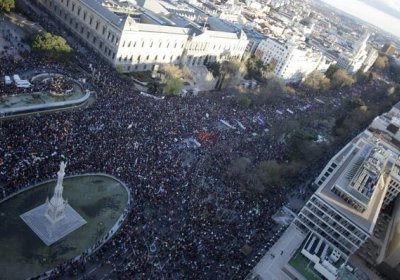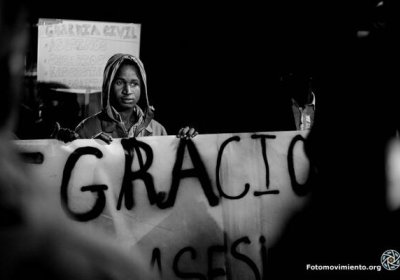“Riot police were on standby as tens of thousands took to the streets in Madrid, Barcelona and other cities across Spain on Monday to demand a vote on whether to rid Spain of its royal family,” Al Jazeera reported on June 3.
Spain
Willy Meyer, who was elected to European parliament in the May poll as lead candidate for United Left (IU), has demanded a binding referendum to allow the people of Spain to choose between the current model of a parliamentary monarchy or a republic. The call came after the June 2 announcement of Spain's King Juan Carlos that he would abdicate in favour of his son, Felipe.
The European parliamentary poll on May 25 was dominated by the victories of the xenophobic and racist National Front (FN) in France (26%, 24 Members of the European Parliament) and the United Kingdom Independence Party (UKIP) in Britain (26.8%, 24 MEPs) — triggering a fit of mainstream media angst.
The angst is understandable. Five years after the 2009 European elections, the political basis for the European Commission’s austerity drive has been severely weakened. This has rendered “governance” of the 28-member European Union even more difficult.
Far right strengthens
The Spanish congress met in Madrid on April 8 to hear a petition from the parliament of Catalonia: that the power to hold a non-binding referendum on its political future be granted to Catalonia under Section 150 of the Spanish constitution.
All political forces in Spain are now straining to adjust to the huge 1 million to 2 million-strong March for Dignity demonstration in Madrid. On March 22, the march greeted the protest columns that had converged on Spain's capital from 12 outlying cities and towns over the previous week.
The enormous success of this initiative is still sinking in. How come an initiative that began outside the mainstream union confederations, the Workers Commissions (CCOO) and the General Workers Union (UGT), could mobilise so many people and eventually force them to declare their support?
The six columns of the “Marches for Dignity”, protest marches against austerity, corruption and the repression of social and civil rights in the Spanish state, reached Madrid on March 22. Hundreds of thousands of people took over the streets of Madrid that day. It was the crowning moment for a movement that began in early March with marches leaving from cities across the Spanish state.
As the May 25 European elections approach, a question that concerns left and progressive people in the Spanish state is just how many left alternatives will end up running against the “parties of government” ― the ruling conservative People’s Party (PP) and the opposition Spanish Socialist Workers Party (PSOE).
The Spanish government’s response to the move by armed Basque pro-independence organisation Basque Homeland and Freedom (ETA) to put its weapons beyond use has clearly demonstrated it favours continuing conflict over peace.
On February 21, ETA released a video showing two of its members meeting with representatives of the International Verification Commission. The IVC were inspecting weapons that had been put beyond operational use.
At quarter to six on the morning of February 6, in a wood on the Moroccan side of the border with the Spanish north African enclave Ceuta, about 300 asylum seekers met to try to cross the six-metre high razor-wire fence seperating the two countries.
The armed group Basque Country And Freedom (ETA has made a significant step towards decommissioning the weapons used in its campaign for independence and freedom, Irish Republican News said on February 21. But the Spanish government immediately rejected the move.
The decommissioning by ETA of some its cache of weapons and explosives, drawing a definitive line under decades of bloody conflict, was confirmed by an International Verification Commission.
The Basque political prisoner Arkaitz Bellon was found dead in his jail cell on February 5, more than 1000 kilometres from his home.
The body of the prisoner from Elorrio, who was 36, was found in his bed. Jail authorities say “his death points to natural causes”, but they will carry out a more detailed investigation. Bellon's lawyers and family have petitioned for a doctor they trust to be present at the autopsy.
Bellon spent 13 years in prison for acts of sabotage and had the date for his release was set for next May.
Tens of thousands of people marched to Spain's parliament in Madrid on February 1 to protest against a proposed new law that would severely curb access to abortion.
Changes to the law would permit abortions to be carried out only in cases of rape or serious risk to health.
The rally was organised by dozens of women's groups fighting for reproductive rights. Participants travelled from across the Spanish state to take part, with trains full of protesters arriving in Madrid throughout the day.
- Previous page
- Page 14
- Next page








